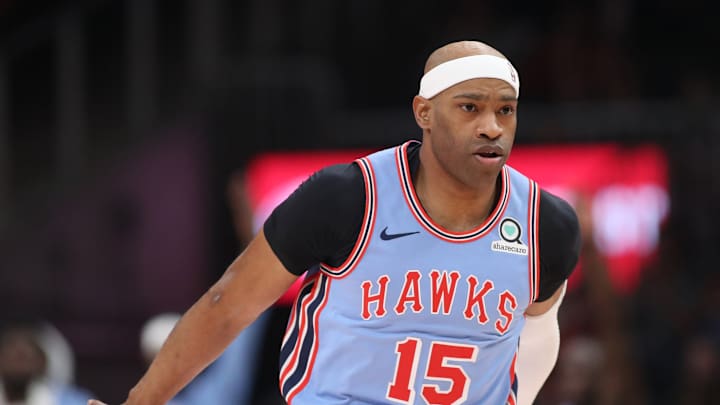Hawks Player Preview: Vince Carter

Don’t let Vince Carter’s age, experience, and veteran wisdom obscure the fact that he remains – at age 43 – a valuable contributor on the court for the Atlanta Hawks. Once a perennial All Star, the 21-year veteran isn’t the player he was in Toronto, New Jersey, or even Dallas. Yet last season, he was a deserving NBA rotation player who played 76 games – many of which he closed.
The vast majority of stars can’t remain dominant through their mid-30s, and some struggle to acquiesce to smaller roles once they lose utility as a primary option. Credit Carter, then, for reinventing himself and embracing a role so many others couldn’t. Consider that he ranked in the 90 percentile leaguewide in usage rate in each of his first seven NBA seasons, but last year used just 16 percent of Atlanta’s possessions in an entirely different role. These days, Carter spends most of his time at power forward spacing the floor for his younger teammates. He shot nearly 39 percent on over four three-point attempts per game last season, and nearly 68 percent of his shots came from deep. He is limited, but has refined perhaps the most important skill one can have in the NBA to a point of mastery.
And yet, Atlanta’s offense dried up with Carter on the court last season. He spent most of his time with bench units that lacked shooting, creation, or both, and played only 141 minutes with both Collins and Young. The Hawks posted an outstanding 117.4 points per 100 possessions in that time, but allowed more than 114 – on par with the team’s horrendous defense for the season. Playing Collins at center leaves Atlanta’s defense dangerously flimsy, and Carter, for all his defensive awareness and communication, doesn’t alone help to shore up the front line. Still, Atlanta’s defense improved significantly when Carter played and the Hawks, who had one of the worst point differentials in the league, actually outscored opponents with him on the court.
The arrival of rookies Cam Reddish and DeAndre Hunter could infringe upon Carter’s playing time, though at this stage in his career the veteran might benefit from reduced minutes. The relationship he forges with those young wings, however, could be just as important as his actual production. Carter isn’t as valuable to a team like Atlanta as he’d be for a championship contender because his teammates simply aren’t good enough to take full advantage of the luxuries he affords. But his presence and mentorship, though overstated at times, are legitimately valuable for a team still finding its way and learning to develop winning habits.
It will be partly on Carter and the newly-acquired Evan Turner to accelerate that process. Veteran leadership comes in different forms, and there isn’t some ubiquitous method of delivering it. For some, it could be insight into handling a star’s load or advice for establishing professional habits; others might need guidance embracing a smaller role or tips on a certain defensive rotation. “It’s situational,” Carter said. “Every player is different.” He knows this because of how much he has changed, his career spanning myriad iterations of himself. Now, in his 22 season, he still has more to offer.
